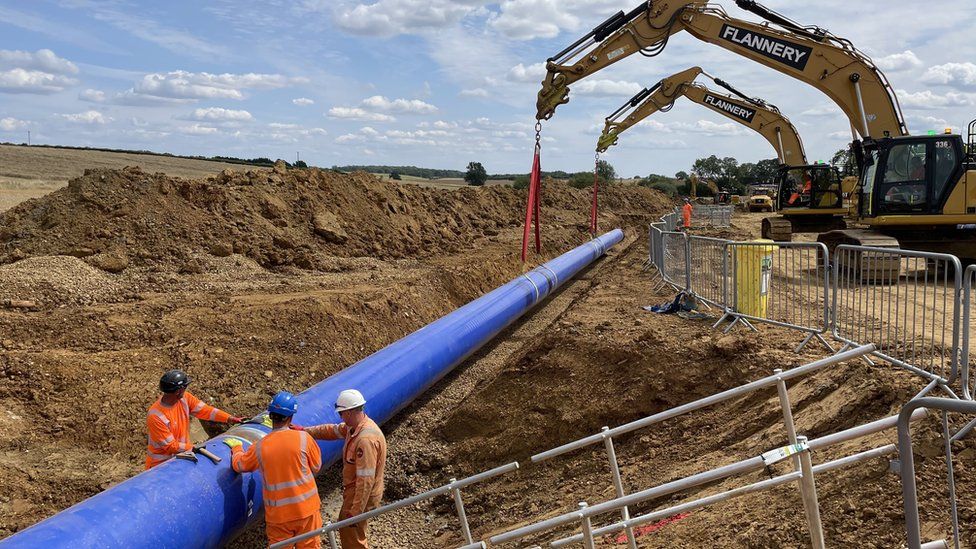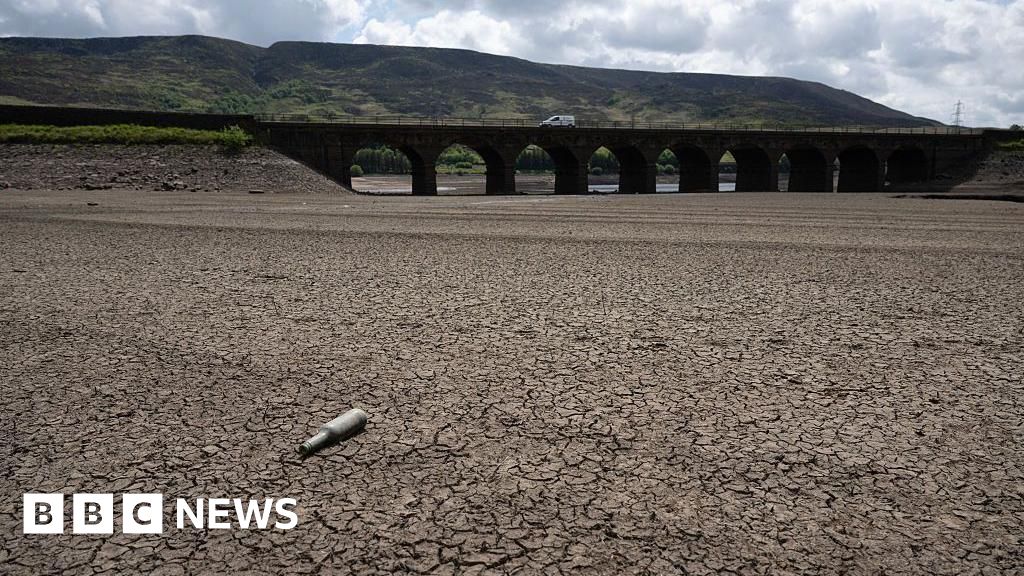ARTICLE AD BOX
 Image source, Ben Schofield/BBC
Image source, Ben Schofield/BBC
A new pipeline would take water from the north of Anglian Water's region, where it was more plentiful, to the south
By Ben Schofield & Naomi Richardson
BBC News, East of England
Water bills would continue to rise to help pay for new infrastructure needed to keep taps flowing, according to a major supplier.
Anglian Water has been building a £500m pipe from Humberside to south Essex and planning two new reservoirs.
It said they were needed as the region's population grew and climate change affected weather patterns.
Investment would also be required to upgrade sewerage systems to cut the amount of discharges into rivers.
The firm's investors pay up front for infrastructure and the cost then gets recouped from bill payers over its lifetime.
'Keeping taps running'
The new 205-mile (330-km) pipeline – longer than the M1 motorway – would move water from the north of Anglian Water's patch, where it was more plentiful, to the south, once operational.
Regan Harris, of Anglian Water, said the pipe was "fundamental to keeping taps running" in the East of England.
Image source, Ben Schofield/BBC
Image caption,Regan Harris said water bills had already increased in part to help pay for new infrastructure
"If we don't take action now in projects like this, as well as new reservoirs for our region, then we simply won't have enough to go around in the future," she said.
"All the water that we have in our region now for our current customer base is spoken for – there is not much surplus left."
Anglian and Affinity Water have been planning a reservoir in south Lincolnshire, while Anglian and Cambridge Water want to build another in the Cambridgeshire Fens. They could be providing water by the mid-2030s and cost more than £4bn to build.
Asked if water bills would get more expensive to support new infrastructure, Ms Regan said: "Well, yes. Bills have gone up by 12% this year and that is funding some of the infrastructure for the long term."
Drone footage shows the £500m water pipe
The new pipe should last between 80 and 100 years, meaning bill payers would spread the cost over several decades.
Ms Harris said when Anglian Water surveyed customers about the need for investment, they said "get on with it", and that they "would rather have small increases to our bills year-on-year... rather than a big lump sum further down the line".
According to Water Resources East, which has been responsible for planning supplies in the region, the East of England was "seriously water-stressed". Anglian Water said it expected the population in its area to increase by one million by 2050.
The company had 4.3 million customers across the East of England, Milton Keynes and part of the East Midlands. According to its latest accounts, it made £169m profit in the year to 31 March and paid the same amount in dividends, up from £96m the previous year.
'Biggest project'
Image source, Ben Schofield/BBC
Image caption,Rob Slade said the pipe would provide "resilience" for customers and help the company protect the environment
Anglian Water announced plans for the pipeline – able to carry 55 million litres (12 million gallons) of water a day – in 2019. It should be completed and supplying water by the end of 2025.
Rob Slade, the company's head of strategic supply integration, said it was the "biggest project" Anglian Water had taken on.
"We're providing more water to where it's needed and providing more resilience to our customers," he said.
Ms Regan said supplies were "resilient" and there was little likelihood of a hosepipe ban this year.
But parts of the East of England remained in drought.
The government set up a water scarcity working group for Cambridge after the Environment Agency objected to plans for thousands of homes, because supplying water to them would "pose a significant risk to the environment".
Part of Mid Suffolk has also effectively closed to new businesses that use large volumes of water.
Neither Cambridge nor Mid Suffolk are supplied by Anglian.
Smart meters
Image source, Ben Schofield/BBC
Image caption,Anglian Water said it would install 1.1 million smart meters by 2025, which should cut demand for water and highlight leaks
Anglian Water's plans also include installing smart meters to all customers by the end of the decade.
The company said they helped cut demand for water by showing people how much water they used, as well as highlighting leaks in homes.
According to its Water Resource Management Plan, the smart meters take hourly meter readings, which are then fed back and available to monitor online. Customers with smart meters saved 3% more water than those without.
Anglian recently fitted one to Alanah Patrick's home in Peterborough.
Image source, Ben Schofield/BBC
Image caption,Alanah Patrick said she did not like to see water wasted
The 25-year-old primary school teacher said she did not to like to see water being wasted.
"It's just me in the house, but when people come and they run the taps for brushing their teeth, it winds me up," she said, "or they have a shower and they leave it running".
"I'm like, 'The water's been on for ages, what are they doing?', because I'm an 'on and in' kind of person.
"I spent most of my life in Cyprus with my dad being in the forces. So it was always, 'There's a drought, you can't run the water.' You'd have cold baths because it takes too long to run hot."
Image source, Anthony Saddington/BBC
Image caption,Monica Mirzac said with the rising cost of living, being able to monitor how much water her family was using was helpful
Ms Patrick's neighbour Monica Mirzac, 38, said it was a "great idea" to have a smart meter. She hoped it would help her save money.
"I think we can use less water. I don't know about others – it's up to them if they want. It depends how much you want to pay.
"These days, we try to save as much [money] as we can."
Find BBC News: East of England on Facebook and Instagram. If you have a story suggestion email eastofenglandnews@bbc.co.ukor get in touch via WhatsApp on 0800 169 1830
Related Internet Links
The BBC is not responsible for the content of external sites.

 1 year ago
59
1 year ago
59








 English (US) ·
English (US) ·